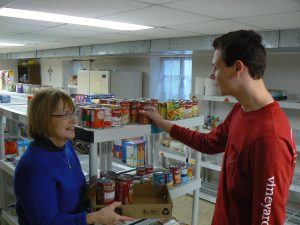The shutdown causes worry and doubt about when I will be able to return to work. I wonder if this will continue – how will I be able to make ends meet? I think the church can walk with those affected by the shutdown by raising the concerns of those impacted to lawmakers. Let elected leaders know their communities are being negatively affected. Churches can also be part of providing emergency assistance and relief to those in need. -Richard, furloughed federal worker and ELCA World Hunger leader, Washington, D.C.
During this government shutdown, those affected are at the front of our minds – and we know you share in this care and concern, too.
The current shutdown impacts many of us and our neighbors – from furloughed federal workers waiting for paychecks to hungry families worrying that the help they need to purchase food may not be there next month.
ELCA World Hunger and the MEANS Database have put together this short, practical list of things to consider and do to help our neighbors. Read and share. But most importantly, remember all our neighbors facing the immediate effects of financial uncertainty during this critical time.
Five Ways to Walk Together During the Shutdown
 Check-in with your local food pantries, feeding ministries and other emergency shelters.
Check-in with your local food pantries, feeding ministries and other emergency shelters.
People facing food insecurity and the programs and ministries that help them are at significant risk during an extended shutdown. Federally-funded programs like SNAP, which help provide support to families facing hunger, have been able to send out payments for our neighbors in need this month and, thanks to a plan put together by the USDA earlier this week, through the end of February, too. But if the shutdown lasts into March or beyond, this funding will run out. Other anti-hunger programs are in danger, too. The Women, Infants and Children (WIC) program, which provides nutrition for pregnant women and children under age 5, faces the same lapse in funds as SNAP, as does TEFAP, which is a primary way food banks and pantries get access to affordable foods for their clients.
Does your congregation have or host a food-related ministry? Stop by and check-in; ask how things are going. What are they seeing and hearing from guests? Ask what the ministry or service provider needs most right now – the answer may surprise you.
If you’re a rostered leader, consider stopping by the space before opening and offering a supportive blessing for the space and those that will share time together today.
Host a “pop-up” food drive.
Once you’ve checked in with your local hunger ministry, host a food drive to help provide the resources they’ve told you they need most. ELCA World Hunger’s “Road Map to Food Drives” resource can get you started.
Pray.
Pray personally and publicly for those who govern, those experiencing hardship due to the shutdown and those who walk with them. As the nation waits for agreement on a new spending authorization, pray that God will guide legislators in their work and will be with our neighbors affected by the government shutdown.
Make a monetary donation to a feeding ministry – locally or globally.
Providing physical food resources through a drive is good, but cash is often better. Cash in hand for your local pantry often means more cans on the shelf than you can buy at the grocery store.
Reach out and support those directly feeling the strain – listen and help make those voices heard.
Who in your congregation, school and community might be affected? Reach out, send a text, let them know you care. What do they need? If you are directly affected yourself, speak that truth and share your story as you can. Consider writing a letter to the editor of your local newspaper or website, sharing a temple talk in church or letting your elected officials know your experience.
For updates, follow ELCA World Hunger and MEANS Database:
@ELCAWorldHunger
@MEANSDatabase
